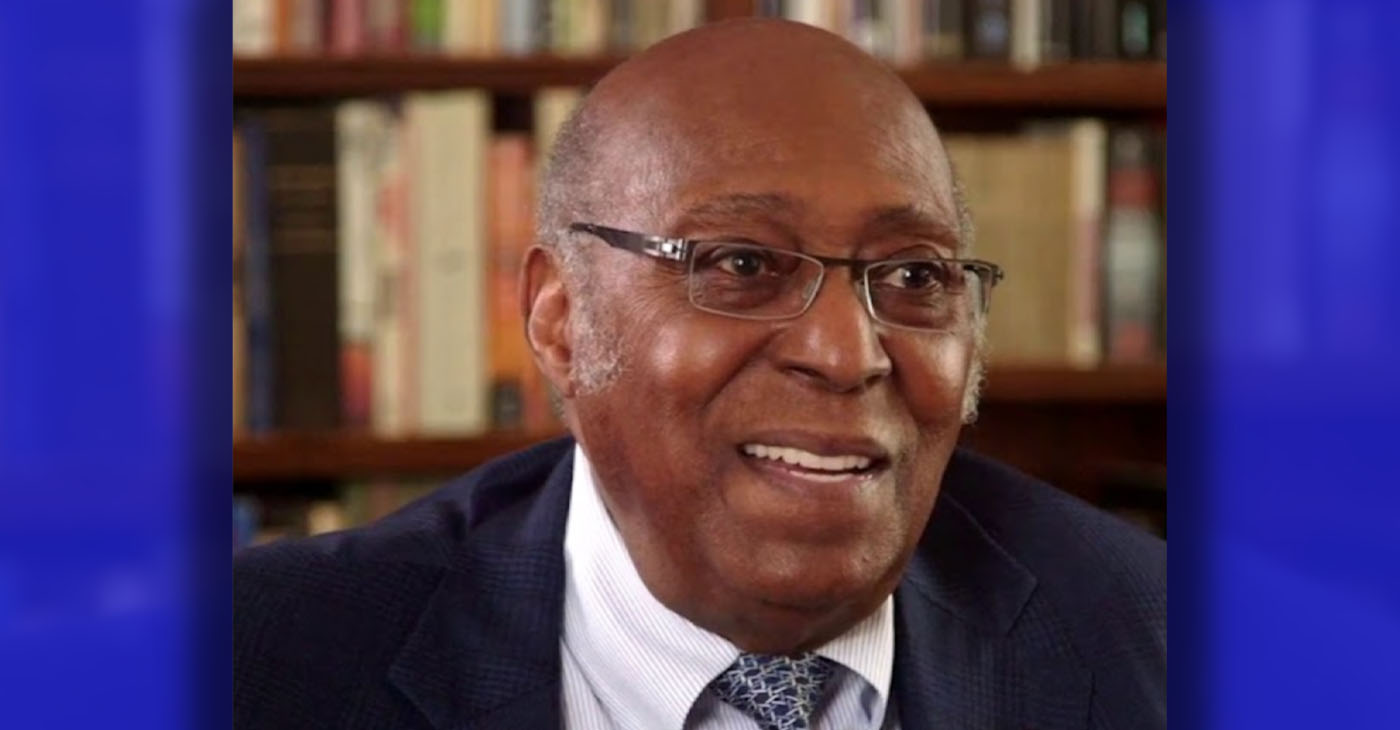#NNPA BlackPress
IN MEMORIAM: Renowned Philosopher and Black Power Trailblazer Charles V. Hamilton, Dies at 94
NNPA NEWSWIRE — A Wallace S. Sayre Professor Emeritus of Government at Columbia University, Hamilton made history as one of the first African Americans to hold an endowed chair at an Ivy League university. His extensive research delved into urban politics and the Civil Rights movement. Another of his notable contributions was, “Adam Clayton Powell Jr.: The Political Biography of an American Dilemma (1991).”
The post IN MEMORIAM: Renowned Philosopher and Black Power Trailblazer Charles V. Hamilton, Dies at 94 first appeared on BlackPressUSA.

By Stacy M. Brown, NNPA Newswire Senior National Correspondent
@StacyBrownMedia
Austin Cooper recalled the first time he met Professor Charles V. Hamilton, a philosophical luminary and key architect of the Black Power movement. Cooper, who earned a Master of Public Administration from the Columbia University School of International and Public Affairs under Hamilton’s tutelage, said the professor wasn’t simply an academic advisor. To Cooper and others, he was a mentor and friend. Mostly, though, Hamilton was “Doc.”
“He hired me to be one of three research assistants at The Ford Foundation where he headed a three-year project on ‘Social Welfare Policy and the American Future,’” said Cooper, the managing editor of the Our House DC newsletter and who, among other accomplishments, served as a State Lobbyist (pension, education and labor) to former New York City Mayor David N. Dinkins and Vice President of Government Affairs for the Turner Broadcasting System, Inc.
Like many others, Cooper was saddened by the news that Hamilton had died at 94. Though his death occurred on Nov. 18, 2023, it was only confirmed and made public this week. Hamilton, a distinguished political scientist, and educator, played a transformative role in reshaping the discourse on racism in the United States through his groundbreaking work, “Black Power: The Politics of Liberation.”
Hamilton’s collaboration with Stokely Carmichael in 1967 produced a seminal piece that challenged traditional civil rights approaches. Unlike Carmichael, known for his impassioned speeches, observers noted that Hamilton brought a quiet and dignified intellectualism to the movement. According to scholars and others who knew him, Hamilton conveyed his profound influence through the strength of his ideas.
He co-authored work that shifted the narrative on racism, introducing the concept of institutional racism to the forefront. Prior discussions primarily focused on overt acts of prejudice, but “Black Power: The Politics of Liberation” redirected attention to the entrenched biases within American institutions. Hamilton’s belief in self-determination and self-reliance for the African American community permeated his work, laying the intellectual foundations for the Black Power movement.
A Wallace S. Sayre Professor Emeritus of Government at Columbia University, Hamilton made history as one of the first African Americans to hold an endowed chair at an Ivy League university. His extensive research delved into urban politics and the Civil Rights movement. Another of his notable contributions was, “Adam Clayton Powell Jr.: The Political Biography of an American Dilemma (1991).”
Thomas J. Davis of the University of New York at Buffalo, who championed the book in a review for the Library Journal, wrote, “Probing Powell’s rise and fall, Hamilton moves from the 1930s, when Powell became a New York City councilman, to his service starting in 1945 as a U.S. Representative, and then to his chairing of the House Education and Labor Committee, his expulsion from the House in 1967, and his defeat at the polls in 1970.”
Davis noted that Hamilton’s “able analysis of the unapologetic, openly arrogant champion of civil rights reflects the race issues of the day within a prism of political theory focused on the conflict of basic American values like majority rule and minority rights.” He concluded that the book was “essential for any serious collection on Black biography, civil rights, or political analysis. Highly recommended.”
Hamilton’s legacy extended beyond academia and his writings; his ideas continue to influence discussions on racial equality and justice. “Doc loved not only teaching, but he inspired me and all of his students to become activists of history in our respective fields of profession,” Cooper remarked. “I considered him to be not only my lifelong teacher, but also a mentor and friend. I will miss him.”
The post IN MEMORIAM: Renowned Philosopher and Black Power Trailblazer Charles V. Hamilton, Dies at 94 first appeared on BlackPressUSA.
#NNPA BlackPress
Remembering George Floyd
#NNPA BlackPress
OP-ED: Oregon Bill Threatens the Future of Black Owned Newspapers and Community Journalism
BLACKPRESSUSA NEWSWIRE — Nearly half of Oregon’s media outlets are now owned by national conglomerates with no lasting investment in local communities. According to an OPB analysis, Oregon has lost more than 90 news jobs (and counting) in the past five years. These were reporters, editors and photographers covering school boards, investigating corruption and telling community stories, until their jobs were cut by out-of-state corporations.

By Dr. Benjamin F. Chavis, Jr.
President and CEO, National Newspaper Publishers Association
For decades, The Skanner newspaper in Portland, the Portland Observer, and the Portland Medium have served Portland, Oregon’s Black community and others with a vital purpose: to inform, uplift and empower. But legislation now moving through the Oregon Legislature threatens these community news institutions—and others like them.
As President and CEO of the National Newspaper Publishers Association (NNPA), which represents more than 255 Black-owned media outlets across the United States—including historic publications like The Skanner, Portland Observer, and the Portland Medium—l believe that some Oregon lawmakers would do more harm than good for local journalism and community-owned publications they are hoping to protect.
Oregon Senate Bill 686 would require large digital platforms such as Google and Meta to pay for linking to news content. The goal is to bring desperately needed support to local newsrooms. However, the approach, while well-intentioned, puts smaller, community-based publications at a future severe financial risk.
We need to ask – will these payments paid by tech companies benefit the journalists and outlets that need them most? Nearly half of Oregon’s media outlets are now owned by national conglomerates with no lasting investment in local communities. According to an OPB analysis, Oregon has lost more than 90 news jobs (and counting) in the past five years. These were reporters, editors, and photographers covering school boards, investigating corruption, and telling community stories, until their jobs were cut by out-of-state corporations.
Legislation that sends money to these national conglomerate owners—without the right safeguards to protect independent and community-based outlets—rewards the forces that caused this inequitable crisis in the first place. A just and inclusive policy must guarantee that support flows to the front lines of local journalism and not to the boardrooms of large national media corporations.
The Black Press exists to fill in the gaps left by larger newsrooms. Our reporters are trusted messengers. Our outlets serve as forums for civic engagement, accountability and cultural pride. We also increasingly rely on our digital platforms to reach our audiences, especially younger generations—where they are.
We are fervently asking Oregon lawmakers to take a step back and engage in meaningful dialogue with those most affected: community publishers, small and independent outlets and the readers we serve. The Skanner, The Portland Observer, and The Portland Medium do not have national corporate parents or large investors. And they, like many smaller, community-trusted outlets, rely on traffic from search engines and social media to boost advertising revenue, drive subscriptions, and raise awareness.
Let’s work together to build a better future for Black-owned newspapers and community journalism that is fair, local,l and representative of all Oregonians.
Dr. Benjamin F. Chavis Jr., President & CEO, National Newspaper Publishers Association
#NNPA BlackPress
Hate and Chaos Rise in Trump’s America
BLACKPRESSUSA NEWSWIRE — Tactics ranged from local policy manipulation to threats of violence. The SPLC documented bomb threats at 60 polling places in Georgia, traced to Russian email domains.

By Stacy M. Brown
Black Press USA Senior National Correspondent
The Southern Poverty Law Center has identified 1,371 hate and antigovernment extremist groups operating across the United States in 2024. In its latest Year in Hate & Extremism report, the SPLC reveals how these groups are embedding themselves in politics and policymaking while targeting marginalized communities through intimidation, disinformation, and violence. “Extremists at all levels of government are using cruelty, chaos, and constant attacks on communities and our democracy to make us feel powerless,” said SPLC President Margaret Huang. The report outlines how hard-right groups aggressively targeted diversity, equity, and inclusion (DEI) initiatives throughout 2024. Figures on the far right falsely framed DEI as a threat to white Americans, with some branding it a form of “white genocide.” After the collapse of Baltimore’s Francis Scott Key Bridge, a former Utah legislator blamed the incident on DEI, posting “DEI = DIE.”
Tactics ranged from local policy manipulation to threats of violence. The SPLC documented bomb threats at 60 polling places in Georgia, traced to Russian email domains. Similar threats hit Jewish institutions and Planet Fitness locations after far-right social media accounts attacked them for trans-inclusive policies. Telegram, which SPLC describes as a hub for hate groups, helped extremists cross-recruit between neo-Nazi, QAnon, and white nationalist spaces. The platform’s lax moderation allowed groups like the Terrorgram Collective—designated terrorists by the U.S. State Department—to thrive. Militia movements were also reorganized, with 50 groups documented in 2024. Many, calling themselves “minutemen,” trained in paramilitary tactics while lobbying local governments for official recognition. These groups shared personnel and ideology with white nationalist organizations.
The manosphere continued to radicalize boys and young men. The Fresh & Fit podcast, now listed as a hate group, promoted misogyny while mocking and attacking Black women. Manosphere influencers used social media algorithms to drive youth toward male-supremacy content. Turning Point USA played a key role in pushing white nationalist rhetoric into mainstream politics. Its leader Charlie Kirk claimed native-born Americans are being replaced by immigrants, while the group advised on Project 2025 and organized Trump campaign events. “We know that these groups build their power by threatening violence, capturing political parties and government, and infesting the mainstream discourse with conspiracy theories,” said Rachel Carroll Rivas, interim director of the SPLC’s Intelligence Project. “By exposing the players, tactics, and code words of the hard right, we hope to dismantle their mythology and inspire people to fight back.”
Click here for the full report or visit http://www.splcenter.org/resources/guides/year-hate-extremism-2024.
-

 #NNPA BlackPress3 weeks ago
#NNPA BlackPress3 weeks agoMLK Bust Quietly Removed from Oval Office Under Trump
-

 Activism4 weeks ago
Activism4 weeks agoOakland Post: Week of April 30 – May 6, 2025
-

 Activism3 weeks ago
Activism3 weeks agoOakland Post: Week of May 7 – 13, 2025
-

 #NNPA BlackPress3 weeks ago
#NNPA BlackPress3 weeks agoTrump Abruptly Fires First Carla Hayden: The First Black Woman to Serve as Librarian of Congress
-

 Activism2 weeks ago
Activism2 weeks agoNew Oakland Moving Forward
-

 Activism2 weeks ago
Activism2 weeks agoAfter Two Decades, Oakland Unified Will Finally Regain Local Control
-

 Activism2 weeks ago
Activism2 weeks agoOakland Post: Week of May 14 – 20, 2025
-

 Alameda County2 weeks ago
Alameda County2 weeks agoOakland Begins Month-Long Closure on Largest Homeless Encampment



















































